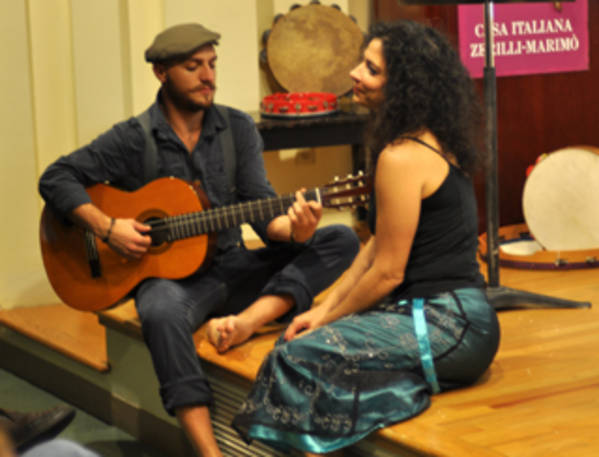


A fishnet covered a screen displaying softly moving waves of a peaceful sea. This simple, yet fitting, decoration welcomed and set the mood for the audience gathered in the auditorium of NYU’s Casa Italiana Zerilli Marimò [2] in anticipation of the performance of AcquAria, another Southern Italian cultural event held at this intimate venue, this one paying tribute to the sea.
AcquAria is a group that draws inspiration from Sicily, its culture, people, history and especially, its music. The lead vocalists of AcquAria are Michela Musolino [3] and Vincenzo Castellana, both uniquely talented young individuals capable of instantly enchanting the audience with the first sounds of their song. Ms. Musolino not only possesses an exquisite and powerful voice but is also a talented percussionist in the Sicilian tradition. Mr. Castellana’s talents beyond singing include the ability to play different instruments, some of which are rarely heard of, such as: the friscalettu, brogna or the marranzanu. This evening the duo was accompanied by Arturo Martinez on the guitar, Vito Galante on the double bass and Thomas Chess on the flute and mandolin. Together the talented artists presented the audience with an ethereal performance that carried all away to the faraway beaches of Sicily.
Upon the initiation of the performance with a song based on the legend of Colapisci, a Sicilian boy who loved swimming so much that he turned into a fish, the serene image of the sea in the background became alive due to the sound effects that the artists created with seemingly simple instruments. Mr. Castellana used a seashell horn while Ms. Musolino created the sound of the surf using grains of rice and swirling them gracefully in a large tambourine. Before beginning each song Ms. Musolino stopped to explain its meaning, legend or storyline. The songs talked about everything from ill-fated lovers immortalized as swordfish in a song titled U Pisci Spada, written by Domenico Modugno, to tragic events, as that of the deadly earthquake and tsunami shattering Messina and Reggio Calabria in 1908 depicted by a song written by Luciano Maio and titled Gricalata. The concert did not fail to include songs of celebration, the tarantellas, upbeat, fast-tempo pieces to which Musolino and Castellana danced and twirled to, playing the tambourine and beating the castanets.
The duo, with the help of three talented musicians painted a vivid picture of the Musica Sicliana. It is evident that they are passionate about what they do and most of all about relaying and infecting the audience with that passion. Ms. Musolino says of Sicilian music: “It is the force of desire and the force of the accompanying emotions that make Sicilian music stand apart from other traditions. It is this desire and these emotions that touch one’s soul and connect one to others be they our present neighbors or be they a people who lived centuries ago. The rawness and the truth of such desires and emotions are understood by all. At the end of physical life, only memories remain. These memories captured in song reach across centuries to bind us together transcending our modernity, our cultural differences and our varied beliefs. Sicilian music reflected the cycle of life, not in real time, but in humanity’s time.”
Culturally rich events such as this one, held in the cozy atmosphere of a small venue are a great way to learn about history, experience the new and unknown or to stay close to one’s own roots and heritage.
Source URL: http://test.iitaly.org/magazine/focus/art-culture/article/acquaria-sound-sicilian-sea
Links
[1] http://test.iitaly.org/files/couplejpg
[2] http://www.casaitaliananyu.org
[3] http://www.michelamusolino.com/MichelaMusolino/Michela_Musolino.html